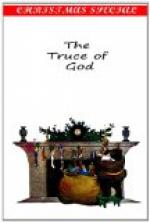He did not even wait for the sentence of excommunication to fall, that now hung by a hair above his head, but began the attack, as if resolved to have the advantage of the first blow. Couriers were despatched to every part of the empire, with commands to all the prelates and nobles upon whom he could rely, to assemble at Worms, where he promised to meet them without fail. Twenty-four bishops and a great number of laymen hastened to obey the summons. The conventicle sat three days, and the following charges were formally preferred against the Pope: “That he had by force extracted a solemn oath from the clergy not to adhere to the king, nor to favor or obey any other Pope than himself; that he had falsely interpreted the Scriptures; that he had excommunicated the king without legal or canonical examination, and without the consent of the cardinals; that he had conspired against the life of the king; that, in spite of the remonstrances of his cardinals, he had cast the Body and Blood of our Lord into the flames; that he had arrogated to himself the gift of prophecy; that he had connived at an attempted assassination of the king; that he had condemned and executed three men without a judgment or an admission of their guilt; that he kept constantly about his person a book of magic.”
So palpably absurd and false were these charges that three of the assembled prelates refused to sign an instrument for the deposition of a pontiff, so little conforming to the ancient discipline, and unsupported by witnesses worthy of belief. Nor were Henry’s machinations confined to Germany, but he ransacked Lombardy and the marches of Ancona for bishops to sign these articles of condemnation, and even aspired to infect Rome itself by presents and specious promises. But the golden ass could not then leap the walls of Christian Rome.
Gregory’s principal accuser was the Cardinal Hugues le Blanc, whom he had previously excommunicated. This ambitious man rose in the council and taunted the Pope with his low extraction, at the same time charging him with crimes that were proved to be the offspring of calumny and error. He produced a forged letter, purporting to come in the name of the archbishops, bishops, and cardinals, from the senate and people of Rome, inveighing against the Pope, and clamoring for the election of another head of the Church. Encouraged by imperial patronage, and stimulated by a desire to rid himself of disgrace by sullying the hands that had branded him, the excommunicated cardinal did not hesitate to call the Pope a heretic, an adulterer, a sanguinary beast of prey. The emperor himself knew Gregory too well to believe such a tissue of absurdity; but he hoped to find others more credulous than himself.




